In a nutshell, freelancers are cost-effective, flexible, and suitable for specialized tasks and smaller projects where you can work closely with one person. Agencies offer expertise, scalability, and established processes, making them ideal for larger or more complex projects that need a team of people with different skills. Consider your project needs, budget, and desired level of support when making a decision.
Freelancers are like solo artists. They’re good at what they do, often focusing on one specific area. This can be perfect if you need something specific done.
On the other hand, agencies are more like whole orchestras. They have a lot of different people who are good at all sorts of things, making sure your project has everything it needs from start to finish. Over the years, with a multitude of projects, an agency develops expertise and establishes quality standards. With them, you can be confident that your projects will be delivered without any surprises.
Consistently recognized as one of the top software development companies on Clutch, the Volpis team has spent the last 8 years creating custom solutions tailored to the specific needs of various companies. And in this article, we want to take an honest look at the pros and cons of both freelancers and agencies. We want to help you make the best choice for your project, making sure it’s a success from day one.
Freelancer vs. software development company: key differences
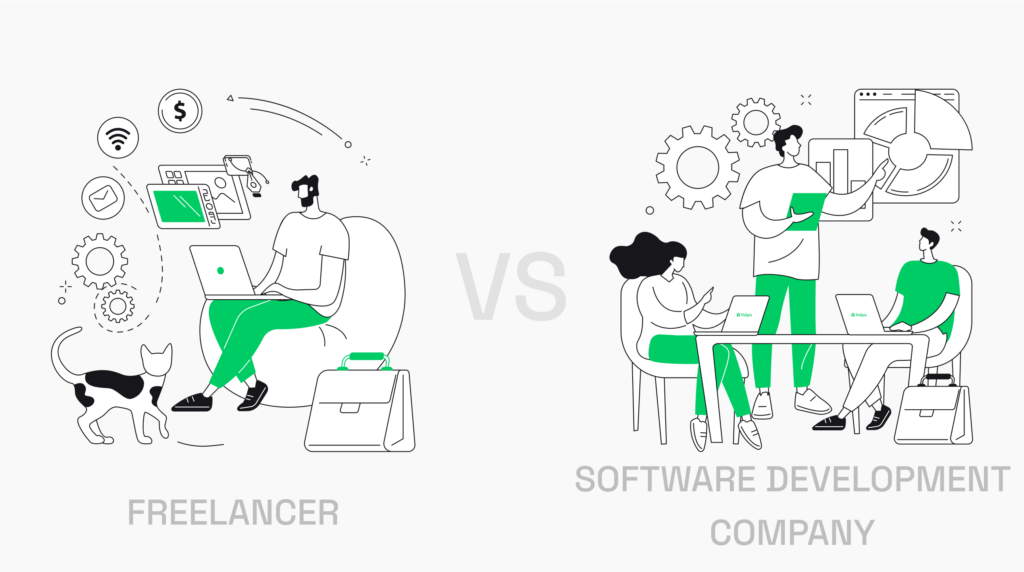
Choosing between hiring a freelance developer or an agency for your project is a big decision that can affect how your project turns out. It’s important to think about what each option brings to the table.
| Aspect of comparison | Freelancer | Software development company (agency) |
| Service spectrum and technical knowledge | Freelancers often carve out niches for themselves, providing deep expertise in a specific domain or technology stack. This specialization can lead to highly skilled work in particular areas, but it may require clients to hire multiple freelancers for different aspects of a larger project. Managing and synchronizing all of them can become challenging. | Agencies offer a wide range of services and expertise under one roof, providing clients with comprehensive solutions tailored to their multifaceted needs. Agencies can tackle a wide array of challenges that span multiple technologies or disciplines, and they take full responsibility for the project. |
| Flexibility and scalability | Freelancers offer personal flexibility and can sometimes adapt quickly to changes in a small-scale project. However, their capacity to handle sudden increases in workload may be limited, which might lead to bottlenecks in project timelines. Additionally, freelancers often juggle freelance tasks with a primary job. | Agencies can scale up or down quickly to accommodate changing project needs or timelines. This allows them to allocate additional resources to a project as needed, ensuring that deadlines are met without sacrificing quality. |
| Collaboration and expertise | Working with a freelancer means tapping into their skill set and perspective. While this can result in unique solutions, the lack of a collaborative team environment can sometimes limit the diversity of approaches available for solving complex problems. | The collaborative environment within an agency brings together diverse expertise and perspectives. This collective approach often results in more refined and comprehensive solutions that benefit from the synergy of a multidisciplinary team. |
| Operational processes | Freelancers might have less formalized processes, which can offer flexibility but also lead to inconsistencies in project management and delivery. The lack of established methodologies might affect the predictability and reliability of outcomes, especially for larger projects. | Agencies follow established operational processes and methodologies that ensure consistency, reliability, and accountability throughout the project lifecycle. This formalization of processes helps in setting clear expectations and delivering consistent quality. |
| Reputation and credibility | While individual freelancers can have strong reputations, these are often built on personal relationships and can vary significantly. Clients might find it challenging to assess credibility and trustworthiness without direct referrals or extensive portfolios. | Agencies often have established reputations backed by a body of work, client testimonials, and industry recognition. This collective credibility, built over multiple projects and client interactions, can offer a higher degree of trust and assurance. |
| Risk mitigation | Higher risk of project disruption due to reliance on a single individual. Freelancers may suddenly disappear. If a freelance software developer becomes unavailable, has health problems, needs to take a vacation, or encounters personal issues, the project could face significant delays. | Because of a team-based structure, agencies ensure project continuity even if individual team members become unavailable. It reduces the risk of delays and ensures that the project remains on track, regardless of individual circumstances. |
| Quality standards | Quality control with freelancers depends largely on the individual’s standards. While many freelancers deliver high-quality work, the absence of a standardized quality assurance process can lead to variability in outcomes. | Agencies maintain consistent quality standards across projects, enforced by systematic quality control measures. This ensures that all deliverables meet a certain threshold of quality, aligned with client expectations and agency reputation. |
| Access to resources | Freelancers may have limited access to specialized tools, technologies, and broader networks, potentially restricting the scope of solutions they can offer. This limitation might impact the efficiency and innovativeness of the project outcome. | Agencies have access to a diverse range of resources, including specialized tools, technologies, and talent pools. This enables them to leverage the most suitable resources for each project, optimizing efficiency and effectiveness. |
| Rates | Freelancers typically offer more competitive rates compared to agencies, reflecting the lower overhead costs of independent operation. This can be a cost-effective option for clients looking for specialized services without the need for a full team. However, the total cost might increase if a project requires multiple freelancers with different skill sets. | Agencies tend to have higher rates due to the comprehensive services they offer, including access to a team of experts, project management, and quality assurance processes. While initially more expensive, the value is in the seamless integration of services, risk mitigation, and the assurance of quality and reliability, potentially providing better long-term value. |
| Schedules | Freelancers often enjoy flexible schedules, which can be advantageous for projects with non-standard hours or tight timelines. However, this flexibility can sometimes lead to unpredictability in availability, especially if the freelancer is juggling multiple projects or personal commitments. | Agencies, with their structured schedules and larger teams, are better equipped to ensure adherence to project timelines. This structure can provide more reliable scheduling and deadlines, reducing the risk of project delays due to individual availability issues. |
| Management of work | When it comes to freelancers, management often falls squarely on your shoulders. You’re the one setting deadlines, ensuring the project stays on course, and handling any hiccups along the way. This can be both empowering and a bit daunting. | Agencies come with project managers and a hierarchy that handles the internal management of their teams. This means less direct oversight is needed from you, freeing you up to focus on the bigger picture. |
| Legal matters | Legal aspects are usually straightforward with freelance software developers. You might not deal with complex contracts, but this simplicity requires you to be diligent in creating non disclosure agreement that protects both parties. | With agencies, the contractual side of things tends to be more robust. Contracts usually cover a wide range of scenarios, offering you better protection for your project and ensuring that legal bases are covered in detail. |
| Quality of work | Freelancers often bring a high degree of passion and personal investment to their projects, which can result in exceptional quality of work, especially in their areas of expertise. However, the variance in quality can be significant from one freelancer to another, making it crucial for clients to carefully select freelancers based on their portfolio and previous work. | Agencies, with their team of professionals and access to a wider array of skills and resources, typically deliver a consistently high quality of work across various domains. The collaborative environment further enhances the quality by incorporating diverse insights and expertise, ensuring a well-rounded and high-standard output. |
Choosing between a freelancer and an agency mostly depends on what your project needs, how big it is, and how it might change along the way.
Pros and cons of hiring a freelancer for software development: why choose a freelancer over an agency?
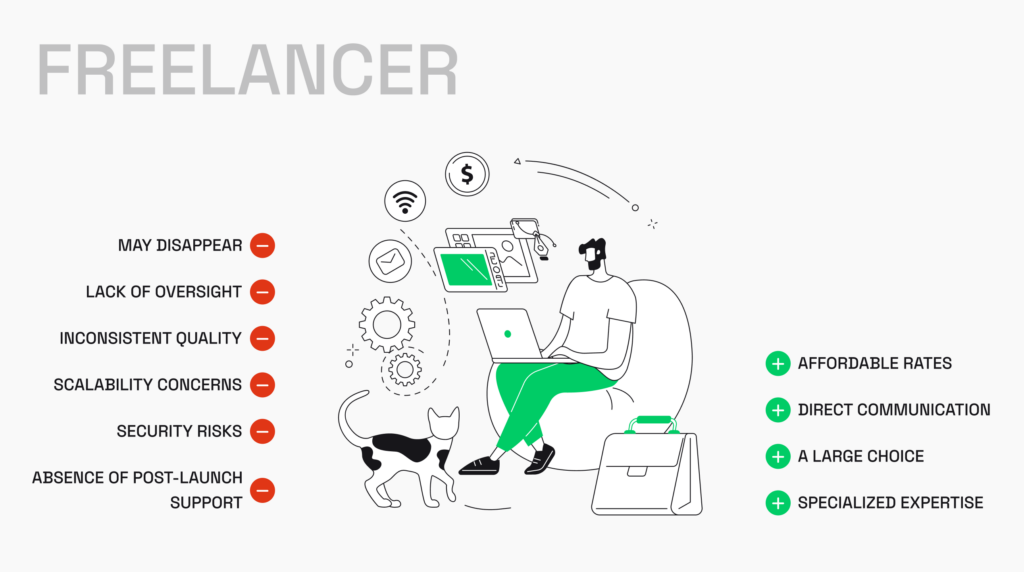
When deciding between hiring a freelancer and an agency, it’s essential to weigh the specific benefits and challenges freelance software developers present.
Advantages of hiring freelancers for software development
- Affordable rates
Freelancers typically have lower overhead costs, which translates into more affordable rates for their services. This cost-effectiveness makes freelance development an attractive option for businesses looking to maximize their development budget.
- Direct communication
Working with freelancers allows for direct and straightforward communication. You can discuss ideas, provide feedback, and make adjustments efficiently, ensuring that the project aligns closely with your vision without the potential miscommunications that can occur in a layered agency structure.
- A large choice
The freelance market offers a vast pool of talent from around the world. This diversity allows you to select individuals who best fit your project requirements, whether you need a specialist in a niche technology or someone in a particular time zone.
- Specialized expertise
Freelancers often focus on specific skill sets, making them highly proficient in particular areas. This expertise is beneficial for projects requiring specialized knowledge or technical skills.
Disadvantages of hiring freelancers for software development
- May disappear
Freelancers might juggle multiple projects, leading to periods where they are unavailable. This unpredictability can delay your project.
- Lack of oversight
Without a senior developer or supervisor, the responsibility to monitor the project’s progress and quality falls entirely on you. This can be a significant drawback if you’re not familiar with software development processes.
- Inconsistent quality
The quality of work can vary significantly from one freelancer to another. While many freelancers produce high-quality work, the lack of a standardized quality assurance process can lead to inconsistent outcomes.
- Scalability concerns
Freelancers might struggle to scale up resources for larger projects. If your project grows in complexity or size, a single freelancer may not be able to meet the increasing demands.
- Security risks
Freelancers working remotely with their own systems can pose privacy and security risks. Without the rigorous security protocols that agencies might have, sensitive project data could be at risk.
- Absence of post-launch support
Freelancers may move on to other projects once yours is completed, leaving you without maintenance and support unless specifically negotiated.
So, when should you choose to hire a freelancer?
Freelancers are a good choice for particular tasks like bug fixes, adding features, refactoring, and developing MVPs, especially when budget constraints are tight.
Pros and cons of hiring a software development agency: why choose an agency over a freelancer?
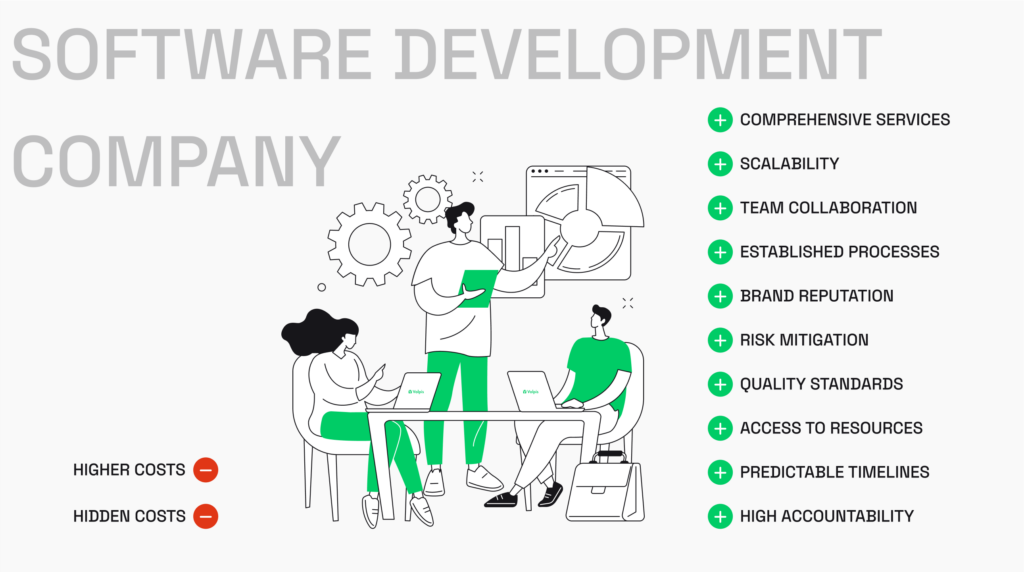
Now, let’s delve into the nuanced advantages and disadvantages of hiring a software development agency.
Advantages of hiring a software development company
- Comprehensive services
Agencies offer a wide range of services and expertise under one roof, providing clients with comprehensive solutions for their projects or campaigns. Beyond coding, agencies provide services like wireframing, design, documentation, research and development, business plan evaluation, built-in analytics, and post-project support. This full package means you can get everything you need from a single source.
- Scalability
Agencies have the capacity to scale up or down quickly to accommodate changing project needs or timelines, offering flexibility and reliability for clients.
- Team collaboration
Clients benefit from the collective expertise and collaboration of a team of professionals within an agency, leading to higher-quality deliverables and innovative solutions.
- Established processes
Agencies typically have established processes, workflows, and quality control measures in place, ensuring consistency, reliability, and accountability in project delivery.
- Brand reputation
Clients working with reputable agencies may benefit from the agency’s brand reputation, industry connections, and track record of successful projects, enhancing credibility and trust. Working with an established agency offers peace of mind through their proven track record and commitment to customer satisfaction. Agencies are motivated to maintain their reputation by providing high-quality services and support.
- Risk mitigation
Agencies mitigate the risk of a single point of failure by providing a team of professionals. Unlike freelancers who may disappear or become unavailable, agencies ensure continuity and accountability for project delivery.
- Quality standards
Agencies enforce quality standards across all projects, ensuring that deliverables meet or exceed client expectations. This consistency in quality is maintained through established processes and quality control measures.
- Access to resources
Agencies have access to a diverse range of resources, including specialized tools, technologies, and talent pools. This enables them to leverage the most suitable resources for each project, optimizing efficiency and effectiveness.
- Predictable timelines
Agencies are skilled at project management, which includes setting and adhering to clear deadlines. Their experience with similar projects allows them to provide accurate timelines for completion.
- High accountability
With an agency, there’s a structured hierarchy that ensures accountability at every project stage. Agencies have reputations to maintain, making them more likely to meet your expectations and adhere to agreed standards.
Disadvantages of hiring a software development company
- Higher costs
The comprehensive services and expertise offered by agencies come at a higher price compared to freelancers.
- Hidden costs
There can be hidden costs associated with additional services or revisions beyond the scope. To avoid surprises that could significantly expand your budget, ensure that your agreement with the agency clearly outlines the scope of work, services included, procedures for handling additional changes, and strategies for addressing project delays. A meticulously crafted agreement provides a clear roadmap for the project, safeguarding your budget and project expectations.
So, when should you choose to hire a software development agency?
You can opt for an agency when your project is large, complex, or requires a variety of skills that need to be coordinated efficiently. Agencies are a good choice when you need a full spectrum of services, from initial development to long-term support.
Is it cheaper to hire freelancers or software development company?
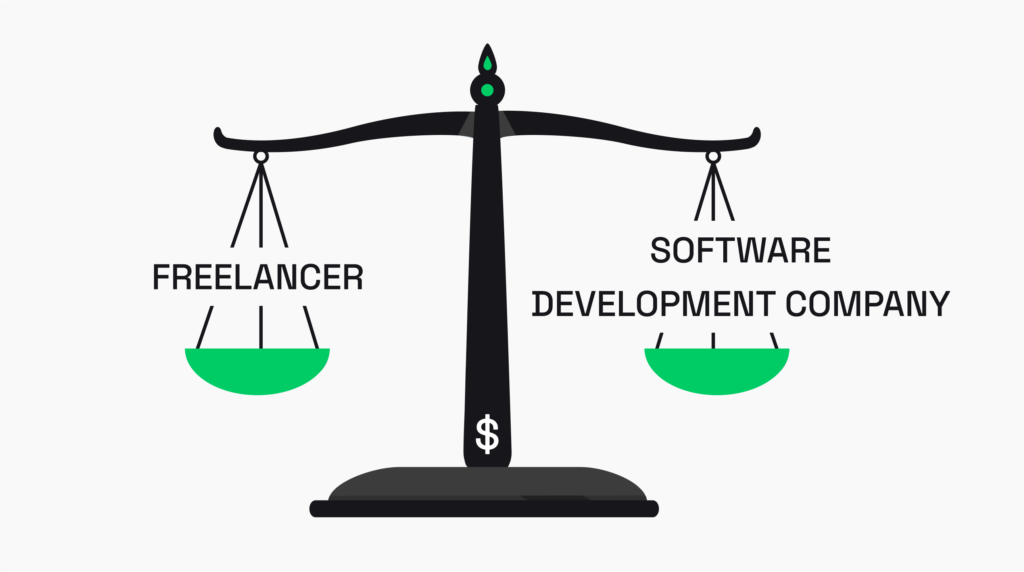
The answer isn’t as straightforward as we might hope. It all boils down to the specifics of your project and what “cheaper” means in the long run.
Imagine you’ve got this killer idea for a mobile app that works on both Android and iOS. Here’s what costs might look like:
| Cost factor | Scenario 1: Hiring a freelancer software developer | Scenario 2: Hiring a software development company |
| Upfront costs | Initially, hiring a freelancer often appears more budget-friendly due to lower hourly rates or project-based fees. However, if your project scope isn’t clearly defined from the start, changes and additions can lead to scope creep, inflating the total cost unexpectedly. | Opting for a software development firm generally involves a higher initial cost. This covers not just the development but also project management, design, quality assurance, and a team of experts in both Android and iOS platforms. |
| Quality assurance and testing | Might not be included in the initial quote, leading to additional costs if you need to hire another specialist for QA and testing. | Typically included in the initial cost, ensuring that the app is tested and polished without additional charges. |
| Technical expertise for both platforms | Might require hiring two freelancers if one is not proficient in both Android and iOS, doubling the cost for expertise. | Included in the package, with teams proficient in both platforms, avoiding the need for additional hires. |
| Tool and technology access | May incur additional costs if the freelancer needs to purchase specific tools or subscriptions to complete your project. These costs can sometimes be passed on to you. | Included in the overall cost. Agencies typically have access to a wide range of professional tools and technologies, eliminating the need for extra expenses. |
When to hire a freelancer, and when to choose a software development company
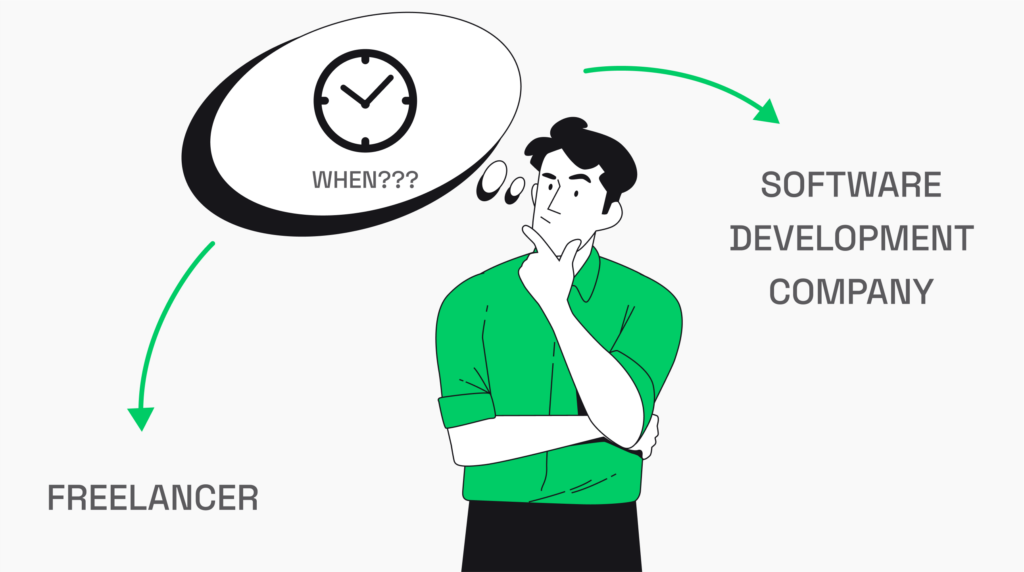
There’s no one-size-fits-all answer here. Sometimes, a solo developer might tick all your boxes, while other times, you might need the backing of a full-fledged company.
Deciding whether to hire a freelancer or app development agency depends on the specifics of your project, your budget, and your long-term goals. So, when it’s best to hire whom?
| Choose a freelancers when: | Choose a software development company when: | |
| Project nature | Small one-and-done projects or hyper-specialized tasks. | Products requiring a broad area of expertise or complicated multi-phase projects. |
| Cost | Seeking more affordable options for smaller budgets. | The project budget is medium to high. |
| Collaboration duration | Engaging in short-term, focused collaborations. | Valuing long-term partnerships and full-time engagement |
| Your involvement | Projects that need your heavy involvement. | Projects where a comprehensive team approach is preferred, minimizing your day-to-day involvement. |
| Skill set | When the project requires highly specific, expert skills not commonly found. | Requiring a wide-ranging array of skills and resources from a diverse team. |
So, whom to choose for your project? Freelancer or software development company? To help you make the call, consider asking yourself these questions before deciding between a freelancer and a software development team:
Is your project large-scale? If you’re dealing with a complex solution packed with heavy-duty features, you’ll likely need the resources and manpower that a company can provide. One person might struggle to handle all aspects of such a project efficiently.
How many technologies does your project involve? For instance, if your app needs payment gateway integration, GPS functionalities, and more, such a task demands diverse skills and extensive experience across various domains.
Do you have time to manage the project on your own? It’s a significant commitment. While some are adept at overseeing every aspect of a project, ensuring efficient organization and no time wasted, others may find it challenging to juggle these responsibilities alongside their other commitments.
How Volpis can bring your software vision to life
Volpis is a software development company that specializes in developing custom software solutions for businesses. Our team, consisting of over 40 in-house experts, brings extensive experience and creativity to each project.
We have successfully designed and developed more than 100 web and mobile applications globally, customizing each to fulfill the specific requirements of our clients. We invite you to explore our portfolio for a detailed look at the software systems we have developed for our clients. Our commitment to excellence is reflected in the glowing reviews from our customers, who consistently praise our dedication to delivering exceptional results.
Read more reviews from our valuable customers here
Our team has extensive experience in developing custom systems for businesses of all sizes. We understand the unique challenges faced by fleet owners and offer customized solutions to meet your specific needs.
We’d love to answer any questions you may have. You can contact us via email at info@volpis.com or connect with us on LinkedIn.
Questions & Answers
FAQ
When hiring developers, is it better to work with an agency or freelance?
When considering developers for your project, whether to work with an app development agency or freelance developers depends on various factors. For larger projects or those requiring a diverse skill set, collaborating with app development agency may be better suited. On the other hand, for smaller projects or particular tasks, working with freelance developers can be more cost-effective. It’s essential to evaluate the project’s scope, complexity, and your specific requirements to make an informed decision.
Is a software agency or an individual freelancer better for outsourcing software projects?
Both software agencies and individual freelancers have their strengths when it comes to outsourcing software projects. A software agency offers a team of professionals with specialized skills and structured processes, ensuring efficiency and quality. On the other hand, an individual freelancer may provide more personalized attention and flexibility to adapt to your project’s unique needs. Ultimately, the choice depends on factors such as project requirements, budget, and desired level of involvement.
Why outsource to an agency?
Companies often opt to outsource work to software development companies for several reasons. This includes access to a development team with specialized skills, cost-effectiveness, and the ability to focus on core business activities. Additionally, outsourcing can help meet project deadlines and achieve high-quality results. By leveraging the expertise of app development agency, organizations can streamline their operations and drive success in their projects. An agency with a successful outsourcing business will strive to build long term relationships and will have all required specialists in place, including designers, project manager, business analysis, account manager and others.
Why are more companies choosing to outsource work?
More companies are choosing to outsource work to a whole development agency due to the cost-effectiveness and flexibility it offers. Outsourcing allows companies to access a broader talent pool and professional assistance without the need for additional infrastructure or resources. Additionally, outsourcing enables organizations to scale resources as needed, ensuring optimal efficiency and project success.
When should an organization choose not to outsource?
While outsourcing offers numerous benefits, there are scenarios where organizations may choose not to outsource work. This includes specific security or confidentiality concerns that require an in-house team’s presence. Additionally, if a project requires constant communication and collaboration, having an in-house team may be preferable to ensure seamless coordination and alignment with organizational goals.
Why is it cheaper to outsource?
Outsourcing can be cheaper for companies due to lower labor costs in certain regions, scalability of resources, and reduced overhead costs associated with maintaining an in-house team. By outsourcing work to software companies, organizations can access cost-effective solutions without compromising on quality or efficiency. This approach allows companies to allocate resources strategically and focus on core business activities while achieving their project objectives.
What are the pros and cons of hiring freelancers?
The pros of hiring freelancers include cost-effectiveness, flexibility, and the ability to work with specialists for particular tasks. Freelancers can be a great choice for tackling certain projects, especially those requiring specialized skills. However, cons may include potential communication challenges, reliability issues, and limited scalability for larger projects. It’s crucial to weigh these factors against your project’s needs before making a decision.
Why do companies prefer to hire freelancers?
Companies may prefer to work with freelancers for their flexibility, cost-effectiveness, and ability to quickly onboard talent for specific tasks. Freelancers can offer a more flexible schedule and may be less expensive than hiring full-time employees, especially for short-term projects or tasks that require specialized expertise.
Is outsourcing cheaper than hiring?
Outsourcing can be cheaper than hiring full-time employees when you need to bring your business idea to life, as companies can save on salaries, benefits, and overhead costs associated with maintaining an in-house team and office space. Additionally, outsourcing allows companies to scale resources based on project needs and save money in the long run. However, it’s essential to carefully consider the costs and benefits of outsourcing versus hiring to ensure the best decision for your specific project.
Is it cheaper to hire a freelancer?
The cost-effectiveness of hiring a freelance developer depends on the scope and requirements of the project. While freelancers may offer lower hourly rates, costs can vary based on factors such as project complexity, timeline, and required expertise. Additionally, freelancers may require additional support or resources to complete certain tasks, impacting overall project costs. It’s essential to consider all these factors to determine whether hiring only one person is the most cost-effective option for your project. Moreover, such freelancers may rapidly pass on certain projects, especially if they’re offered more money elsewhere or if they’re overloaded with other freelancers. This can result in delays or disruptions to your project timeline. Additionally, relying solely on one freelancer may not provide a universal response to your project needs, as they may not possess all the necessary skills from nearly all professions and resources. Therefore, it’s crucial to weigh the cost-saving benefits against the potential risks and limitations of hiring only one freelancer for your project.
How to select the best freelancer?
To select the best freelancer, evaluate their expertise in building mobile apps for both iOS and Android, their experience, portfolio, and reviews from past several clients. Look for independent contractors (self employed person) who have accomplished work quality working hours and good feedback from many clients. Additionally, consider their communication skills, availability, and ability to meet project deadlines and requirements. Hiring freelancers position a project big, you need to ensure they can handle the workload and deliver the desired final product within the specified timeline. Avoid unreliable freelance platforms or generic platforms. So many freelancers tend to have chaotic work processes and can suddenly disappear because of working on many projects for multiple clients simultaneously or not very high degree of commitment, so it is of utmost importance to discuss this aspect as well to find a really trustworthy person, one developer who is jacks of all trades, can offer more services, has efficient operation process and can handle your specific task with utmost care.
How to select the best software development agency?
To select the best company, consider factors such as the company’s expertise, portfolio, client reviews, and business analysts. It’s worth noting that all the agencies have their own unique strengths and capabilities. Look for development companies with experience in similar projects and positive feedback from previous clients. Additionally, evaluate their communication processes, organizational difficulties, and project management capabilities, as well as their ability to handle required customization and handle urgent tasks and several projects simultaneously. Hiring a company offers professional expertise and a team of software developers with diverse skills, ensuring a smooth development process from start to finish.
Why hire an agency over a freelancer?
Hiring an agency over a freelancer offers several advantages, including access to a team of professionals with diverse skills, structured project management processes, and ongoing support and maintenance services. Additionally, agencies may provide assurance of quality and reliability, backed by their reputation and track record.
Should I hire a freelancer or an agency?
The choice between hiring a freelancer or an agency depends on several factors. If you have a specific, well-defined project and prefer a more personal touch with potentially lower costs, a freelancer might be the ideal choice. On the other hand, if the project is large, complex, and requires a variety of skills or quick scalability, an agency with its broader resources and structured support might be more suitable.
Why hire dedicated developers instead of freelancers?
Hiring dedicated developers from an agency rather than freelancers can be advantageous for several reasons. Firstly, agencies often provide a more structured and reliable framework for development, including comprehensive project management, quality assurance, and the ability to quickly scale teams as needed. While agencies may have higher costs due to overhead expenses, these costs contribute to a more streamlined and often higher-quality development process. Furthermore, agencies can offer additional services such as specialized recruitment and technical support, which can significantly ease project execution and ensure professional results.
How much does it cost to hire a programmer for an app?
According to Clutch, the average cost of hiring app developers is between $25 to $49 per hour. They also mention that on average, most mobile app development projects cost around $10,000 to $49,000 to fully complete and launch.

Kostya Khuta, the CEO of Volpis, is an expert in crafting custom software solutions for the Fleet Management, Logistics, and Transportation industry. With over 8 years of experience, he leads the way in delivering innovative and tailored solutions to meet industry-specific needs.





